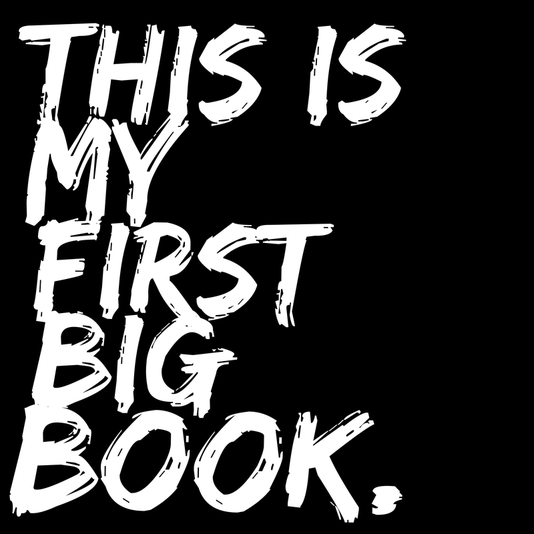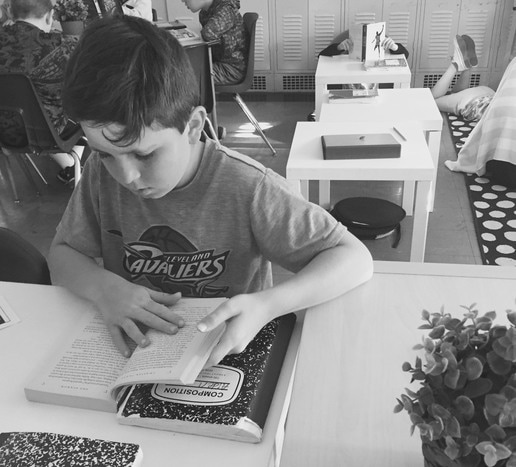|
My hardest work of the day is when my kids have settled in with their books. The lights are down low, but not too low. The windows are open to let in the breeze. It takes us a few moments to get into the zone. Once the crinkling of headphones bags, the logging-in on Audible, and the shifting of chairs comes to a halt, I get to work.
Conferences look different based on what readers need at the time. Some days I kid watch from a couple of different spots in the room and fill out an engagement inventory. On other days, you will see four or five kids huddled around my kidney table reading quietly as I check in with each reader. Most of the time, I will be working one on one with my readers. The goal is simple: readers spend workshop time reading, and I spend workshop time helping them with their reading. It is my job to help readers grow. To make them feel like reader is a name they are worthy of. They are worthy of the name, and sometimes it takes many conversations throughout the year to help them try that on that name, to help them own it. How can so many teachers continue to ask me how I know that my kids are reading? How can so many teachers continue to require logged reading, when the answer is as simple as the goal? Give kids time to read, access to books and then work to help them as they grow and try on the name of reader. Be there for the conversations, because I promise they are the best part. The conversations are taken to a new level when you are living a readerly life, yourself. Talking with kids about reading is the heart of workshop. Yes, I will work with readers on goals to help them grow. Maybe they are working to recognize pieces of plot in fiction to deepen their understanding. Maybe they are working on visualizing a mental movie as they read. Those things are all an important part of my work, but my favorite thing about these conversations is the heart that each individual reader brings to them. Last week, I met with a fourth grader who was rereading Kazu Kibuishi's Amulet series. First off, how advanced is that decision to reread a series? I started the conference by telling this reader that I was beyond impressed with this move. Then I asked him why? I like to keep things open-ended because let's face it, whoever is doing most of the talking, is doing most of the working. His response helped reaffirm why these conversations are so important. He said "The first time I read this series, I read with my heart. This time, I'm going to let my brain do the work." Profound. A fourth grade reader actually said this to me. Please tell me, where would he have added this response on a standardized test? On a reading log? On a multiple choice quiz? In a fat packet with literal comprehension questions for each book? There is no place for heart work on these measures. The place for heart work is during conferences. Conversations between two readers will tell you everything you need to know about a reader, and more. That day, I also met with about four other readers in his class. Keeping my check-ins at about five a day gives me the chance to meet with my kids once a week, at least. As I sat down next to another reader, I noticed he had a copy of Anne Ursu's Breadcrumbs, a book I had book talked just a few days prior. A book that I did not imagine seeing in the hands of this reader. I picked up Breadcrumbs and said "whoa, nice." He then said "Yeah, I am already 80 pages in and I really like it so far." I followed up with "80 pages? That's past the point of no return, what made you choose this one?" He told me that when he heard me book talk Breadcrumbs, it reminded him of Elsa from Frozen. He said he knew he wanted to give it a try because he liked Elsa and he hadn't spent any time reading fairy tales during the school year (that week we had completed a mini lesson on gaps in our reading lives). Then he looked over at me and said "This is my first big book." Being the outstanding actress that I am (I really wanted to cry), I simply said "wow, how does that feel?" He fidgeted with the book in his fourth grade hands and said "It feels really good." This. This is what I am talking about. That reader had no limits from his teacher. That reader was not afraid to tell his teacher that he likes Elsa from Frozen. He was not afraid to try something new, step out of the box because of the safe community in our classroom. The community is a pivotal piece, because if you don't have it, conversations might not sound like this. Conversations connect readers. Connected readers make up a community. Communities of readers can change the world. One heart at a time.
2 Comments
The intense gaze of an engaged reader.
Each day I am a researcher in the field. Observing. Listening. Note taking. Talking with my subjects. Don't ignore all the little signs that readers are fully engaged. Hunched over in anticipation. Hand underneath the next page ready to turn. A gasp. A sigh. An UGH. And my favorite: "Mrs. Riedmiller!!!!! ..........." How did we get here? Well, it took a lot of hard work. It took a teacher who chooses to read a lot because she finally loves it again, it took daily protected time for reading, it took support for readers while they stretched out their limbs, it took a library full of engaging books that just happen to be there for these particular readers, it took a library down the hall and down in the valley to fill my gaps, it took readers seeing their teacher as a reader too. It also took their teacher deciding the only materials they needed were books and notebooks. It took their teacher dropping all of the TPT bullshit. It took their teacher pulling a Mr. Acevedo and saying "this is a no worksheet zone!" It is hard work. However, it is work that can and must be done. How can we encourage other teachers in our building to join this journey with us? It isn't enough that we are the only ones (or one of few) doing this work. You have the community in your own classroom? Guess what? Now it's your sole mission to bring it to every other classroom in your building. In your district. Don't like how heavy it feels? Then you need to walk away from this post right now. Come back when you're ready. Somehow, we need to take a step back. Take a step back from all the interventions, all of the material purchasing, all of the red tape, and decide that we value literacy. We value it in a way that says we will fight to get books into kids hands, and those books will be ones the readers picked, not us. We value it in a way that means we will continue to grow as educators, even when the district mandated PD might not be what does it for us. My core support group is filled with people that don't even live in my state. Reach out. We're out here, I promise. We value it in a way that shows it because we make time for it. You make time for the things you value. Period. If you value a packet full of graphic organizers over a book a kid chose in his own hands, then shame on you. It's not good enough that you say "this is how we've always done it." It's not good enough that you feel like your hands are tied. It's not good enough to continue to say that no one listens to your requests. Get louder! Get smarter! Get tougher! This fight is ours. It's on our shoulders, it's our responsibility. We can't continue to blame administration or whoever else is in the way that week. Stop telling your kids to have a growth mindset when you don't. Stop throwing RIGOR in their face when you shut down at the mere assumption that the answer is no. The top paragraph showcases what I want, and I am not willing to give it up. If you want it too, you have to fight for it. Ask the tough questions, push back when decisions are made that don't contribute to the greater good. Fight for what you believe in! Get up. Dust yourself off and get back to work. We are here to serve kids. No one else. |


 RSS Feed
RSS Feed
